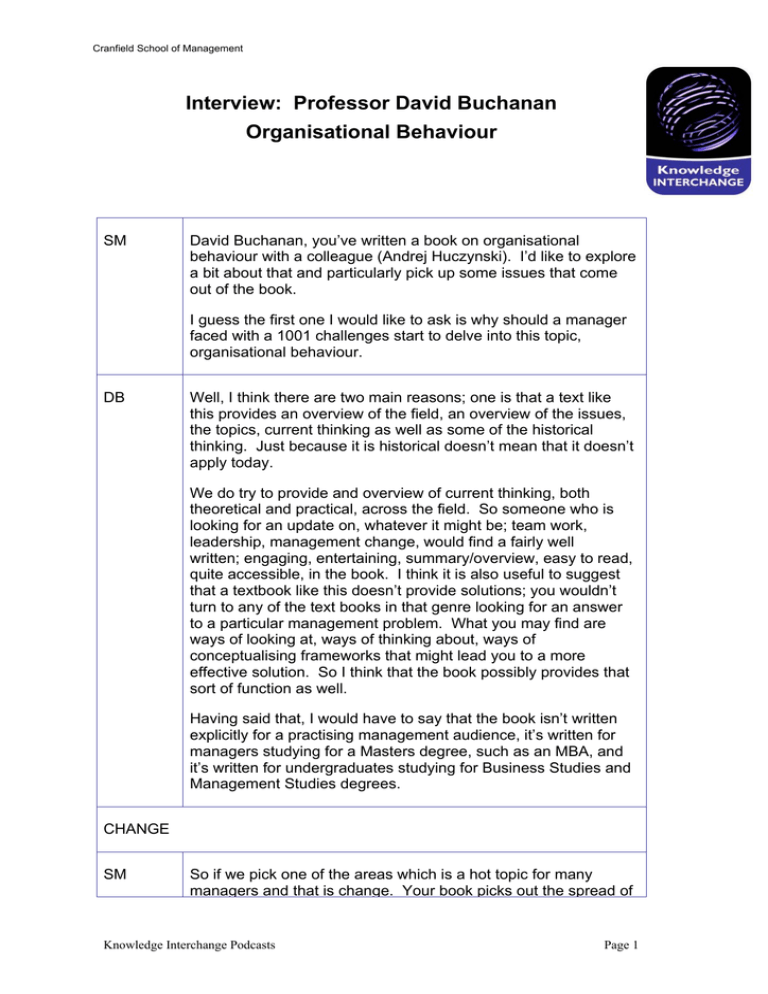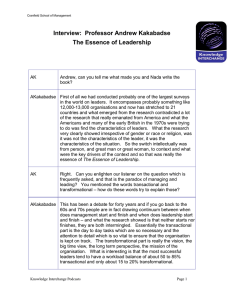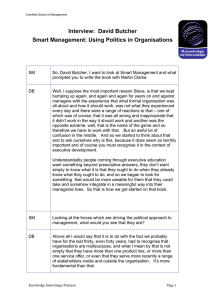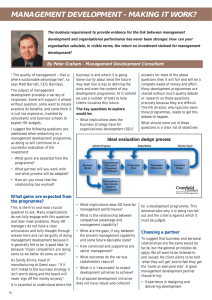Interview: Professor David Buchanan Organisational Behaviour
advertisement

Cranfield School of Management Interview: Professor David Buchanan Organisational Behaviour SM David Buchanan, you’ve written a book on organisational behaviour with a colleague (Andrej Huczynski). I’d like to explore a bit about that and particularly pick up some issues that come out of the book. I guess the first one I would like to ask is why should a manager faced with a 1001 challenges start to delve into this topic, organisational behaviour. DB Well, I think there are two main reasons; one is that a text like this provides an overview of the field, an overview of the issues, the topics, current thinking as well as some of the historical thinking. Just because it is historical doesn’t mean that it doesn’t apply today. We do try to provide and overview of current thinking, both theoretical and practical, across the field. So someone who is looking for an update on, whatever it might be; team work, leadership, management change, would find a fairly well written; engaging, entertaining, summary/overview, easy to read, quite accessible, in the book. I think it is also useful to suggest that a textbook like this doesn’t provide solutions; you wouldn’t turn to any of the text books in that genre looking for an answer to a particular management problem. What you may find are ways of looking at, ways of thinking about, ways of conceptualising frameworks that might lead you to a more effective solution. So I think that the book possibly provides that sort of function as well. Having said that, I would have to say that the book isn’t written explicitly for a practising management audience, it’s written for managers studying for a Masters degree, such as an MBA, and it’s written for undergraduates studying for Business Studies and Management Studies degrees. CHANGE SM So if we pick one of the areas which is a hot topic for many managers and that is change. Your book picks out the spread of Knowledge Interchange Podcasts Page 1 Cranfield School of Management Professor David Buchanan change, the frequency of change, and certainly that would be the experience of many managers. Reading the chapter on change, you have a particular take on change and how you manage it. Would you like to explain what that is? DB We do. I think if one turns away from a textbook like this to the practical management literature on change, what you find is what one commentator called “in-step” guides. You find Kotter’s 8 Step recipe for Managing Change, you find Tony Eccles’ 9 Step Recipe for Managing Change, you find David Guest’s 18 Step Recipe for Managing Change which makes the process appear to be logical, neat, tidy, step-wise, and also manageable. The change process of course isn’t like that and most managers find it difficult to apply those neat, tidy recipes, mainly because they don’t work. They need to be translated into a specific organisational context. So you need to take the recipe, add creativity, add informed managerial judgement, then those kind of recipes start to work. The problem is they are very often not presented in that way; they’re presented as a check list and you follow that through. And that is why they don’t work. The book also picks up a couple of other issues. One is what’s known as the process perspective on change, which very simply argues that the change process is messy, iterative, untidy, and usually highly politicised. Most of the recipe guides to change don’t pay any attention to the organisation politics of the change process. In this book- as I would normally argue -that if, as a change agent, as a manager trying to drive change, you’re not prepared to engage the politics of your organisation you will fail, sooner or later, and probably sooner. The value of the process perspective on change is that it confronts the messy nature of the process and also the politicised nature of the process. It tends not to be as helpful to managers, however, in terms of offering concrete, practical, checklist style advice but it is a way of looking at the process. In other words if you approach change hoping it will be neat, tidy and step-wise, you’ll be disappointed: if you approach change knowing that it’s going to be messy and untidy you won’t be taken by surprise, and I think that that’s valuable information to have in the first instance. The other thing I think is worth mentioning is that we have a perception in the early 21st Century, which was probably a perception in the second-half of the 20th Century, is that change now is happening faster, and is more unpredictable, and more uncontrollable than at any previous time in our history. And I’ve Knowledge Interchange Podcasts Page 2 Cranfield School of Management Professor David Buchanan seen what I’ve just said quoted in a book written in 1922. So in the 1920’s managers were saying exactly the same thing about: the pace of change, the rapidity, the unpredictability, the uncontrollability. One has to wonder if that experience of rapid non-stop change-upon-change is a common one and not unique to our time. So what one starts to see in some of the management commentary is, on the one hand, an argument that change is happening too fast, we need to rush to keep up, change-upon-change, adaptive reorganisation, constant organisational redesign, repeat reorganisational redesign; and other commentators saying that’s actually damaging, it’s causing burn-out, it’s causing initiative fatigue, and that’s reducing individual, team and organisational performance; stop it. One famous commentator argues for “painless change” in which we see a combination of what he calls “tinkering and nudging”; small scale changes interspersed with carefully timed, more carefully phased, major changes so that we don’t see major changes constantly hitting people before they’ve had a chance to embed the last set of changes that they were hit with. That’s potentially damaging for organisational performance. So you’ve got a theoretical perspective on change called “process, contextual perspective” which has, I think, quite fundamental practical implications for the way in which we view change and the change process and the way in which we view the timing, the phasing, the planning, of the change process. SUPERHERO LEADERS SM Almost certainly, in all the things that I’ve read, change needs a strong leader. I know you’ve got some views in your book about the superhero leader, and how that actually works in practice. DB The correct practical and academic answer to those sorts of questions is that “It depends”; however, in the latter half of the 20th Century one sees the development of a new perspective on leadership, variously known as: new leadership, super leaders, transformational leadership. Even in 2007 you can attend a programme on transformational leadership; what they are, how to become one. What one starts to see around the turn of the century, however, following a number of well known multinational corporate scandals, is a series of commentaries appearing in some of the practical management literature pointing out that in some settings, those transformational leaders are dangerous. One commentator describes them as a “dangerous curse”. Why? - transformational leaders are hired specifically, going back to our previous topic, to drive change; to drive radical change, so they potentially destabilise the organisation and then destabilise Knowledge Interchange Podcasts Page 3 Cranfield School of Management Professor David Buchanan it again with further radical change and you are back to what I mentioned earlier; burn out and initiative fatigue. Now, it may be that in some settings, in order to save the organisation, that kind of repeated radical change is required, it’s fine. If, however, that style of leadership is employed simply because it’s fashionable, then it’s not difficult to see that it may cause problems for other people in the organisation faced with that style repeatedly. So there isn’t an argument, as always, that says that transformational leadership is always dangerous. There is an argument that says, as with any approach, perspective or tool, use that with caution, don’t use the same tool, the same approach, the same style to deal with every problem that you might face. So it is useful to locate transformational leadership as a fashion in that broader argument about the way in which one might approach organisational problems in the first place. MIDDLE MANAGERS SM You seem to be championing the role of the middle manager in the whole leadership process. DB A lot of the research, and our own research; I’ll come back to the phrase “middle manager” in a second, suggests that when you look at the implementation, not just at the initiation of a change programme but at implementation, one very often finds that though there may be a change leader, a project champion of some kind, change is usually a collective exercise, usually a collective endeavour, if you don’t have a number of people contributing to that agenda, to that effort, change either doesn’t happen or happens slowly. What one sees in some of the research is the concept of leadership constellations, leadership teams. These aren’t necessarily fixed teams either, they can be quite fluid. So there might be half a dozen people, or ten or fifteen; the size of that team may come and go, might enlarge or contract depending on the needs of the change process at any one time. So that’s quite a different concept from a single, senior, heroic, transformational leader charging off driving a change process. It tends to be a collective effort, and it tends to be a fluid collective effort as well. Yes, there is quite a bit of commentary on middle managers as change drivers, and some commentators are talking about Knowledge Interchange Podcasts Page 4 Cranfield School of Management Professor David Buchanan management by stealth; below the radar, which isn’t heroic, it isn’t visible, it’s relatively slow. But we also know that small scale changes accumulate. Strategic change doesn’t have to be big bang; strategic change can actually be the accumulation of a lot of smaller scale changes, which don’t necessarily have to happen slowly. You can still drive small scale changes quite rapidly, and these can accumulate over a period of months or a year, to quite major strategic change. What our own research shows in healthcare is that change responsibilities go even well beyond middle managers, and what we start to see is the concept of distributed change leadership, distributed change agency, involving staff right across the organisation; a diagonal slice top to bottom. In one particularly successful change involving service redesign in prostate cancer services, part of our study was to find out how did you manage these changes so successfully? Who was on the project team? Who was the project leader? All of those questions got blank looks; there was no project team, there was no project leader. When we then asked who was involved, we ended up with a list of about 200 different people, and also in healthcare a number of different organisations as well. So that was quite a widespread, distributed, collective effort in terms of managing those successful changes; with management support but not with traditional management leadership and project leadership. So I’ve got a view of the change process where in some organisations, in some settings, the transformational leader may be a valuable mechanism for delivering the kind of changes you want: but at the other end of the spectrum a model of the change process that is dispersed, that is distributed, that involves significant numbers of people from across the organisation. And that has implications for skills development, for management development: if you’re going to involve people in change, it would be useful if they knew something more about the process they were being engaged in, and the kind of tools they might find useful. As (currently) a lot of that management development effort is focused on middle and senior managers, and not necessarily on those who might take benefit from it. POLITICS and POWER SM Several times we’ve touched on, and I’d like to explore more, the issue of politics and power. You’ve got a decent section on that Knowledge Interchange Podcasts Page 5 Cranfield School of Management Professor David Buchanan and clearly that is important, and you’ve raised it in this context a number of times. DB Organisations are political systems, period. If you can’t deal with the politics of the organisation, then you are going to find the management role a very uncomfortable one. That said, a lot of managers don’t like the politics and wish that it could be managed away. I think that’s unrealistic, political behaviour is a naturally occurring phenomenon, we are ambitious individuals and in most organisations you have what I would call a “competition of ideas”; especially when we are talking about change, business development, service improvement. And in that competition of ideas, all ideas in that organisational setting have one feature in common, which is that “my ideas are better than your ideas”. Well two features are common: “my ideas are better than your ideas”, and “I want to make damn sure that we go with my plans, initiatives, and projects, and not yours because mine are better”. As soon as you bring creative, ambitious individuals into an organisation you trigger that competition of ideas. And, for sure, we can sit around the table and discuss, and we might eventually agree in the group that Steve’s ideas are better than Dave’s ideas. I can do one of two things at that point: one is I can back off, accept that my business case wasn’t as strong as yours and support you to the hilt; the second thing I can do is back off, admit that my business case wasn’t as strong as yours, tell you that I will back you to the hilt until I get out of the door and then find some other way to shut you down, steal your budget, get a budget from somewhere else, recruit members of your team somewhere else in the organisation. That is not a daily occurrence, but that happens, and from a management point of view one needs to accept that. That makes it sound as if politics is negative and bad. The problem, of course, is that some of the time Steve, your ideas are lousy ones, and somebody really does have to shut it down. And if we can’t shut it down by formal means it could damage the organisation, and the team, and the group; so let’s try and find some covert means of shutting it down. I think politics is also valuable because you need the debate, you need the challenge, you need that stimulus. If you don’t have the debate, lousy ideas get implemented. If you don’t have the debate, even the covert political debate, then the person putting forward the change proposal isn’t forced to: run some figures, gather better evidence, represent the business case, speak to Knowledge Interchange Podcasts Page 6 Cranfield School of Management Professor David Buchanan people, marshal support, visit reference sites, they’re not forced to lift their game. It’s called the social facilitation argument. You need resistance to change, you need that challenge. And I think, to be fair, people are recruited into organisations because they’re creative, because they’re energetic, because they’re enthusiastic, because they want to run with their ideas and they want to run with their ideas in competition with other people’s ideas. The politics in most organisations is part of the dynamic for change, it’s not negative at all, it’s where the energy comes from. That’s not to say that politics can’t be damaging, of course it can, but as long as the politics is… can I come back to the “competition of ideas”… as long as the politics is about my ideas and your ideas; and I don’t like your ideas; but you don’t like my ideas – let’s discuss that and argue about it, that’s fine and I think that’s usually productive. So long as it’s about the competition of ideas. When the politics is about: “I don’t like you Steve! I’m going to do what I can to shut you down!” It’s personal. Then it becomes extremely damaging, time-wasting and expensive. But a lot of the time the politics is about the challenge, it’s about the ideas, and that’s healthy, for heaven’s sake. Reasonable people, as somebody once said, are bound to disagree. In fact there is a book by Jeffrey Pfeffer recently, it’s on evidence based management, there’s a nice quote near the beginning where he says “When two people always agree, one of them is unnecessary.” So politics can be damaging of course, but most of the literature reviews “all politics as always damaging”; that’s unrealistic, that’s not what happens in practice. ORGANISATIONAL BEHAVIOUR - FUTURE RESEARCH SM If I look at the future, and your direction in the research in this big area of organisational behaviour, what’s particularly interesting you at the moment? DB Two or three things. One is organisation politics, it’s an underresearched area, for obvious reasons; think of the questions you need to ask and the answers you are not going to get. So there Knowledge Interchange Podcasts Page 7 Cranfield School of Management Professor David Buchanan is an awful lot about organisation politics that we don’t know. And most of the work in that area is American, it’s handled in a very traditional, positivistic, scientific way which doesn’t really get below the surface about the way people feel about politics, the way it affects them, the way they use it. A huge, huge area there which is waiting for further investigation: the problem of course is research access; how to get managers to talk about this. Now I’ve been successful in doing that in the past, it is time consuming, and it’s a controversial topic. So that would be item number one. I’m currently engaged in a joint initiative with the Open University, with a study of corporate governance arrangements in healthcare, and the possible links between governance arrangements and performance. That’s again a fashionable topic, governance is a key issue in healthcare at the moment, always has been, but it’s particularly key and topical now. That project is in an early stage so I can’t really talk about the findings. But that should produce some interesting findings over the next year or two, which I hope will also translate into management development programmes as well as academic publications; so that would be a second area. Because it is also to do with change, if there is an early finding from the study it is that governance arrangements are not static, they are always becoming something else in the light of the pressures and the issues that boards of directors are experiencing at any one point in time. So these are fluid structures, fluid arrangements. Which immediately throws up the problem of how one might attempt to correlate governance arrangements with performance in any simple or straightforward way. I don’t think you can do that. That brings me back to the third area. And it links back to our earlier discussion of the wheel that you mentioned, which is a diagnostic tool for understanding and managing the sustainability of change. What we see at the moment, and have done for the past 4 or 5 years mostly of this century, is a movement called “Evidence Based Management” based on the apparent success of a movement called “Evidence Based Medicine”. The problem with the Evidence Based Management model is that it assumes that we can gather and use evidence relating to the way that we run organisations, in the same way that we can gather and use evidence relating to medical treatments. I think that is false. I don’t think that while we can study the impact of sodium chloride on blood pressure, I don’t think you can study the impact of Total Quality Management on organisational performance in the same way. Biomedical science uses a traditional variance based approach in which we try and correlate independent and Knowledge Interchange Podcasts Page 8 Cranfield School of Management Professor David Buchanan dependent variables: the kinds of models that we need to use in management are different. The kinds of models that the Evidence Based Management people are using rely on the biomedical, positivist framework. I think we should be using the kinds of models based on, as I mentioned earlier, process theory: it’s about the flow of events, the sequence of events, the combination of factors that interact with each other over time. You can’t separate these out into independent and dependent variables. We need other models of causality. I’ll mention two, there are others, one is a model of causality based on what is called Cumulative Effects, in other words “a build-up of pressure towards”. And the obvious, silly example is a child on one end of the see-saw. You put a brick on the other end, and nothing happens. Put another brick on, still nothing happens. Eventually you put a brick on and the child will rise. Which brick? Well that’s a silly question. You know that it’s the combination; it’s a cumulative effects argument. You see this publicly with government Ministers. David Blunkett was a case in point; where one incident tarnished his reputation, but he was secure in his job. A second incident tarnished his reputation, but he was secure in his job. Once he got to three or four of those incidents, “We’ve had enough, David!”- gone. If you look back at those episodes it’s quite clear that there wasn’t a single incident in that person’s career that eventually drove them from office, that’s another model, but it was an accumulation of events. So one sees that happening. So we need to be looking not at independent and dependent variables, but at the flow of events, the sequence of events over time, the cumulative effects, and also at what is called “Conjuctural Causality”. You would see an example of that on the sustainability wheel, which is intimidating as there are a dozen different factors on there. That is not a cumulative effects argument, that’s saying: “What combination of issues over time leads to these outcomes?” And if you know what that combination is, what that conjuncture of events at different levels of analysis looks like, that enables you to stand back and replicate that somewhere else. It might not necessarily be that you have to copy precisely the same configuration, but you might need an equivalent configuration, a similar configuration. I do this sometimes in research methods classes, by asking the group to think of the best party they ever went to. You end up with a conjuctural explanation, which is a combination of events on that evening; everything just came together perfectly. That’s unique, it’s idiosyncratic, but if you abstract from that you can work out fairly quickly how you could repeat the best party somewhere else on the planet, but with most, if not all of the same ingredients of some kind there. So, I’m interested in the way in which organisational behaviour will Knowledge Interchange Podcasts Page 9 Cranfield School of Management Professor David Buchanan evolve away from very traditional, dated, inappropriate, models of biomedical science for evidence based management; towards less reductionist, more process based models of explanation. Which I think, at the end of the day, are more useful from a practical management point of view than simplistic models that don’t work in practice. SM OK, thank you. Transcript prepared by Learning Services for the Knowledge Interchange www.cranfield.ac.uk/som Knowledge Interchange Podcasts Page 10 Cranfield School of Management Produced by the Learning Services Team Cranfield School of Management © Cranfield University 2007



